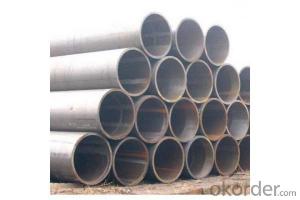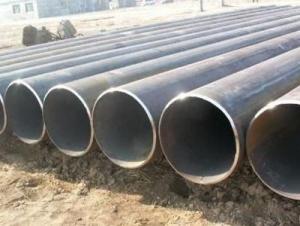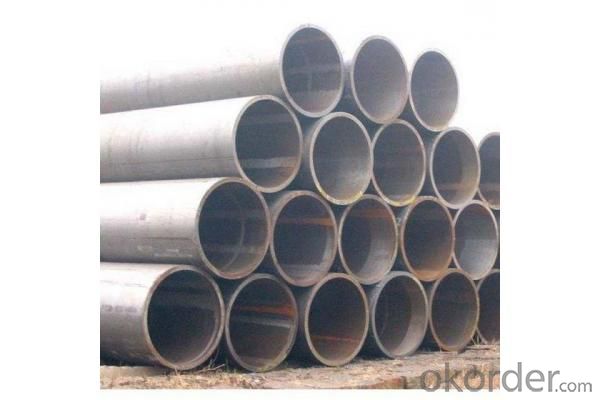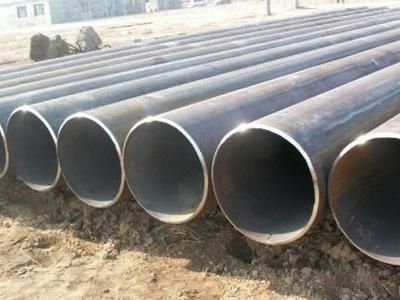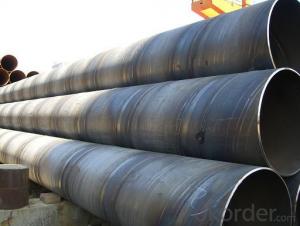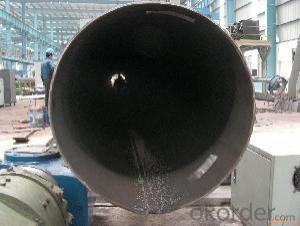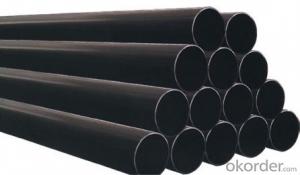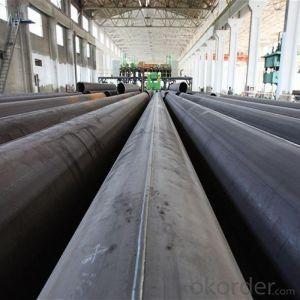API SSAW LSAW CARBON STEEL PIPE LINE OIL GAS PIPE 60''
- Loading Port:
- Tianjin
- Payment Terms:
- TT OR LC
- Min Order Qty:
- 5 m.t.
- Supply Capability:
- 3000 m.t./month
OKorder Service Pledge
OKorder Financial Service
You Might Also Like
Packaging & Delivery
Packaging Detail: | standard export packing or as customer's requirement |
Delivery Detail: | within 10 - 30 days |
Specifications
Spiral Welded Steel Pipes and Tubes
1.Material:Q195-Q235
2.Length:1-12m
3.WT:1.0-14mm
4.O.D.:20-273mm
Spiral Welded Steel Pipes and Tubes
Product Description:
1.Material : Q235,Q345,L245,L290,L360,L415,L450,L485,GrB,X42,46,X52,X56,X60,X65,X70,X80,X100
2,Standard: SY/T5037-2000,GB/T9711-2011,API Spec 5L PSL1/PSL2,ASTM A252\A53,ISO3183,DIN17172,EN10217,JIS G3457,AWWA C200,ASTM A139,ASTM A671,ASTM A672
3.Wall thickness: 3.0mm-30mm
4.Outer diameter: φ168mm-3020mm
5,Length: 5m-12m or as your requirement
6,Corrosion protection standard: DIN30670,DIN30671, AWWAC210, AWWA C203, SY/T0413-2002,SY/T0414-2002
7,Application: Oil, gas, natural gas, water pipe, thermal electricity pipe, steel structure engineering, etc
Q195-q345 Material Steel Pipe's Materials
Elements | Chemical Compsition% | Mechanical Property | ||||||
C% | Mn% | S% | P% | Si% | Yield Point (Mpa) | Tensile Strength(Mpa) | Elongation | |
Q195 | 0.06-0.12 | 0.25-0.50 | <0.050< span=""> | <0.045< span=""> | <0.030< span=""> | >195 | 315-430 | 32-33 |
Q215 | 0.09-0.15 | 0.25-0.55 | <0.05< span=""> | <0.045< span=""> | <0.030< span=""> | >215 | 335-450 | 26-31 |
Q235 | 0.12-0.20 | 0.30-0.70 | <0.045< span=""> | <0.045< span=""> | <0.030< span=""> | >235 | 375-500 | 24-26 |
Q345 | <0.20< span=""> | 1.0-1.6 | <0.040< span=""> | <0.040< span=""> | <0.55< span=""> | >345 | 470-630 | 21-22 |
Packaging & Delivery
Packaging Detail: | Normal exporting packing,in container or bulk vessel or as per clients' request |
Delivery Detail: | 2 months after confimed contract |
Specifications
Large Diameter API 5L X70 PSL2 LSAW Steel Pipe
Grade: X42, X46, X50, X52, X60, B, C
OD: 1.5"-28"
WT: SCH10-SCH160
Large Diameter API 5L X70 PSL2 LSAW Steel Pipe
Specifications:
u Standard: API 5L
u Grade: B, C, X42, X46, X50, X52, X56, X60, X65, X70, X80
u OD: 1.5"-28"
u WT: SCH10-SCH160
u Length: 5-12m
u Ends Finish: plain end, bevel end, grooved end
u Surface Treatment: bare, black varnished, oiled finish, red color, anti-corrosion, 3PE, FBE or epoxy coating
u Technique: hot rolled or cold drawn
u Application: api 5l steel pipe for conveying oil, water, gas
u Invoicing: based on theoretical weight or actual weight
u Payment Terms: L/C at sight, T/T or Western Union
u Trade Terms: FOB, CFR, CIF
u Certification: ABS manufacturing assessment, ABS design assessment, API 5CT, API 5L, DNV manufacturer certificate, ISO9001 quality management system certificate, ISO14001 environment management system certificate, GB/T28001 occupational health and safety management system certificate, A1 class manufacturing license of special equipment certificate, CCS, GL, LR, SGS, TüV, PDE
- Q: What are the standard dimensions for steel pipes?
- The standard dimensions for steel pipes vary depending on the application and industry. However, common sizes range from ½ inch to 48 inches in diameter and have various wall thicknesses based on the required strength and pressure rating.
- Q: What are the common uses of stainless steel pipes?
- Various industries widely use stainless steel pipes for numerous purposes. Some common applications of these pipes include: 1. Plumbing and Water Supply: Stainless steel pipes are popularly utilized in residential, commercial, and industrial plumbing systems due to their resistance against corrosion, durability, and capacity to handle high-pressure situations. They are also employed in water treatment plants and wastewater management systems. 2. Oil and Gas Industry: The oil and gas industry extensively relies on stainless steel pipes for the transportation of oil, gas, and other fluids. These pipes can endure high temperatures, pressure, and corrosive environments, making them ideal for this sector. 3. Food and Beverage Industry: The food and beverage industry frequently employs stainless steel pipes because of their hygienic properties and ability to resist corrosion. These pipes are commonly used for the transportation of liquids, gases, and food products in processing plants, breweries, wineries, dairies, and other food-related facilities. 4. Chemical and Petrochemical Industry: Stainless steel pipes play a critical role in the chemical and petrochemical industry, where they are utilized for transporting corrosive chemicals, acids, and other hazardous substances. The pipes' resistance to corrosion and high temperatures makes them suitable for these demanding applications. 5. Construction and Architecture: Stainless steel pipes are utilized in construction and architecture for various purposes such as providing structural support, creating handrails, guardrails, and decorative elements. Their strength, durability, and aesthetic appeal make them a popular choice in contemporary architectural designs. 6. Automotive and Transportation: The automotive industry relies on stainless steel pipes for exhaust systems, fuel lines, and other components that require resistance to high temperatures and corrosion. These pipes are also used in the transportation of fluids and gases in ships, trains, and airplanes. 7. Pharmaceutical Industry: The pharmaceutical industry necessitates high-quality materials that adhere to stringent sanitary standards. Stainless steel pipes are commonly used in pharmaceutical manufacturing processes for transporting liquids, gases, and chemicals due to their cleanability, resistance to corrosion, and compatibility with pharmaceutical products. 8. Power Generation: Stainless steel pipes find applications in power plants, both conventional and renewable, for various purposes such as steam lines, condensers, and heat exchangers. These pipes are selected for their ability to withstand high temperatures, pressure, and corrosive environments. In conclusion, stainless steel pipes have a wide range of applications in various industries, including plumbing, oil and gas, food and beverage, chemical and petrochemical, construction, automotive, pharmaceutical, and power generation. Their resistance to corrosion, durability, and ability to handle high temperatures and pressure make them a versatile and reliable choice for numerous industrial applications.
- Q: What is the maximum length of steel pipes available?
- The maximum length of steel pipes available can vary depending on the manufacturer and the specific requirements. However, standard lengths for steel pipes typically range from 18 to 24 feet.
- Q: Can steel pipes be used for water distribution networks?
- Yes, steel pipes can be used for water distribution networks. Steel pipes are commonly used for water distribution due to their durability, strength, and resistance to corrosion. They can efficiently handle high water pressure and are suitable for both underground and above-ground installations. However, proper protective coatings are necessary to prevent rusting and maintain water quality.
- Q: What are the different methods of inspecting steel pipes?
- There are several methods of inspecting steel pipes, including visual inspection, non-destructive testing (such as ultrasonic testing, magnetic particle testing, and dye penetrant testing), radiographic testing, and eddy current testing. These methods help identify any defects, such as cracks, corrosion, or wall thickness variations, ensuring the quality and integrity of the steel pipes.
- Q: What is the maximum bending radius for steel pipes?
- The maximum bending radius for steel pipes typically depends on the specific grade and diameter of the pipe, but generally, it ranges from three to five times the pipe's outer diameter.
- Q: What are the common factors affecting the flow capacity of steel pipes?
- There are several common factors that can affect the flow capacity of steel pipes. 1. Pipe Diameter: The diameter of the pipe is one of the most significant factors affecting flow capacity. The larger the diameter, the greater the flow capacity as there is more area for the fluid to pass through. 2. Pipe Length: The length of the pipe also plays a role in flow capacity. Longer pipes generally have higher frictional losses, which can reduce the flow capacity. 3. Surface Roughness: The internal surface roughness of the steel pipe can impact flow capacity. Rough surfaces create more friction, which can reduce the flow rate. Smooth pipes, on the other hand, allow for smoother flow and higher flow capacity. 4. Fluid Properties: The properties of the fluid being transported through the steel pipe can affect flow capacity. Factors such as viscosity, temperature, and density can impact the flow rate. For example, highly viscous fluids will have lower flow capacity compared to less viscous fluids. 5. Pressure Drop: Pressure drop along the length of the pipe is another factor that affects flow capacity. As fluid flows through the pipe, there may be pressure losses due to friction, bends, or restrictions. Higher pressure drops result in lower flow capacity. 6. Pipe Material and Wall Thickness: The material of the steel pipe and its wall thickness can influence flow capacity. Different materials have different properties that can affect flow rates. Additionally, thicker walls can reduce the internal diameter of the pipe, resulting in lower flow capacity. 7. Pipe Layout and Fittings: The design and layout of the pipe system, including the presence of fittings such as valves, elbows, and tees, can impact flow capacity. These fittings can cause additional pressure drops and turbulence, reducing the overall flow rate. It is important to consider these factors when designing or evaluating a steel pipe system to ensure optimal flow capacity and efficiency.
- Q: Hot galvanized steel pipe for use?
- 1, galvanized layer uniformity: steel pipe sample in copper sulfate solution immersion 5 times continuously, must not turn red (copper plated)2, surface quality: galvanized steel pipe surface should be complete galvanized layer, must not have plating on the black spots and bubbles exist, allow little rough surface and local zinc tumor exists.3, galvanized layer weight: according to the requirements of the buyer, galvanized steel pipe can be used for zinc layer weight determination, its average value should be not less than 500g/ square meters, and any sample shall not be less than 480g/ square meters.
- Q: Can steel pipes be used for water supply networks?
- Yes, steel pipes can be used for water supply networks. They are commonly used for water distribution due to their durability, strength, and corrosion resistance. However, proper coating and maintenance are essential to prevent rusting and ensure the longevity of the steel pipes in water supply systems.
- Q: Can steel pipes be used for underground utility lines?
- Yes, steel pipes can be used for underground utility lines. Steel pipes are commonly used for various underground applications, including water, gas, and oil pipelines. They are known for their strength, durability, and resistance to corrosion, making them suitable for underground installations where protection against external elements is required. Additionally, steel pipes are often used in areas with high traffic loads or areas prone to natural disasters, as they provide excellent structural integrity and can withstand heavy loads and external pressures.
Send your message to us
API SSAW LSAW CARBON STEEL PIPE LINE OIL GAS PIPE 60''
- Loading Port:
- Tianjin
- Payment Terms:
- TT OR LC
- Min Order Qty:
- 5 m.t.
- Supply Capability:
- 3000 m.t./month
OKorder Service Pledge
OKorder Financial Service
Similar products
Hot products
Hot Searches
Related keywords
